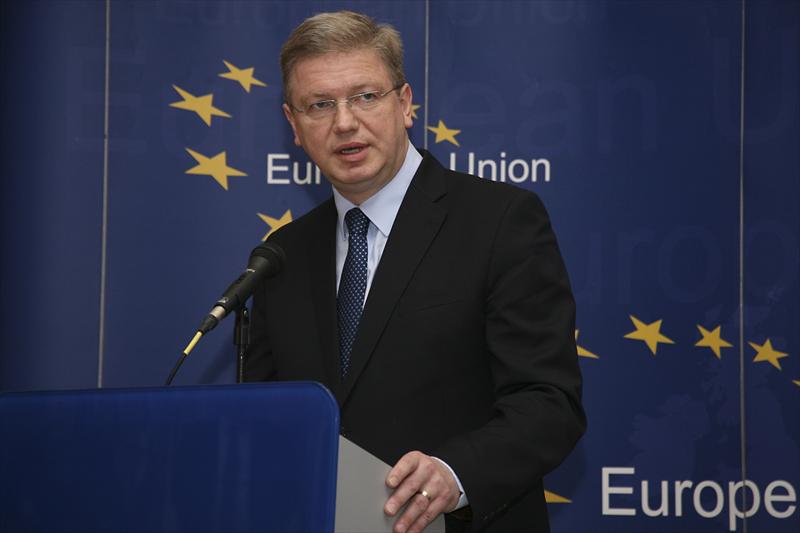Commissioner for Enlargement and the European Neighbourhood Policy Štefan Füle gave an interview for SRNA agency on EU – BiH Structured Dialogue on Justice.
Two years have passed since the opening of the EU – BiH Structured Dialogue on Justice, how do you consider this process? Some voices suggest that this process is delivering too slowly. What is your comment?
I disagree with these pessimistic views, wherever they come from. I rather feel that the Structured Dialogue has helped Bosnia and Herzegovina to overcome some important difficulties on its path towards European Integration. This platform has inaugurated the engagement of the European Commission on one of the most sensitive sectors for the European integration process. I agree that much more could and should have been achieved. Yet, thus far we have managed to discuss and achieve consensus at the technical level on matters that before the dialogue were extremely divisive and often subject to harsh political rhetoric and confrontation. Moreover, a series of concrete deliverables has already been met within this framework. We should not underestimate the importance of the positive developments in regional cooperation, especially with the entry into force of extradition agreements with neighbouring countries, as well as with the signing of protocols on cooperation in war crimes with the prosecuting authorities of Croatia and Serbia. Through these instruments, and with full respect of the right of the victims, 200 individuals who were previously facing immunity through a legal loophole now will be facing justice. These achievements are also fundamental in relation to regional reconciliation, a principle that is at the centre of the European ideal.
The BiH Ministry of Justice is presently preparing two important pieces of legislations. Do you believe that the new draft Law on the Courts of BiH would weaken the BiH state judiciary?
Let me first clarify one issue before we discuss the draft legislation: the existence of state level judicial authorities and institutions is not under discussion. The EU has consistently being vocal in supporting the state judiciary and it has contributed to its consolidation with a substantial flow of financial assistance, as well as with continuous political support. This is a message that I passed already at the very beginning of the process, when I inaugurated the first meeting of the Dialogue in Banja Luka back in June 2011. As always clarified, identifying shortcomings in the current system, is a necessary step to entrench the state judiciary in the institutional architecture of the country and possibly, to clear once for all the ground from any possible criticism. The new draft Law goes in this direction, although some details are still in the process of being defined and agreed upon amongst key stakeholders. The Venice Commission has provided an opinion that highlights some points of concern and suggested concrete recommendations which needs to be addressed in the draft that will ultimately be presented to the Council of Ministers. The current draft provides for the creation of a new separate Appellate Court at the State level, mirroring the jurisdiction of the Court of BiH. This draft legislation was thoroughly discussed in Brussels at the first thematic plenary meeting of the Dialogue, hosted last Friday July 12 in the premises of the European Commission. Discussion has been very constructive and there is confidence that a final convergence amongst all participants could soon be reached.
Do you think there is a need for amending the Law on HJPC, which is also on the agenda of the Dialogue at the moment?
The members of the High Judicial and Prosecutorial Council themselves have acknowledged that the current legislation could be further improved and therefore proposed back in October 2012 a set of concrete suggestions for amendments. We look forward to receive the set of amendments that is being prepared by the Ministry of Justice of BiH and we expect that the opinion of the Venice Commission will also be requested. Along the lines of our previous practice, we will carefully evaluate the proposed changes against the backdrop of the relevant European standards and practices. Yet, as stressed numerous times, the HJPC remains for the EU a key pillar upon which the balance between independence and accountability of the Judiciary is built.
How do you see the future of the Dialogue?
The future of the dialogue will depend on the interest and the constructive approach of BiH authorities at all levels to, so to speak, exploit positively this unique opportunity that they have been given by the EU. The reforms recommended through the Structured Dialogue are not simply cosmetic; they are tackling some fundamental questions that this country would have to address if it wants to have a future as member of the EU. It will be up to the governments and parliamentarians to vote for new Laws or amendments and thus adapt the existing legislation to transpose the relevant European standards and EU acquis. In both phases we will remain committed to promote the respect of the relevant European standards and EU acquis, with a view to advance the system of this country in the delivery of justice for all its citizens. But one thing is clear: the Dialogue has no alternative in paving the way for the country’s European future and preparing its judicial systems for the next, but not less difficult stage of negotiations with EU. We are happy that the recent regional context has indicated how things may work eventually.




